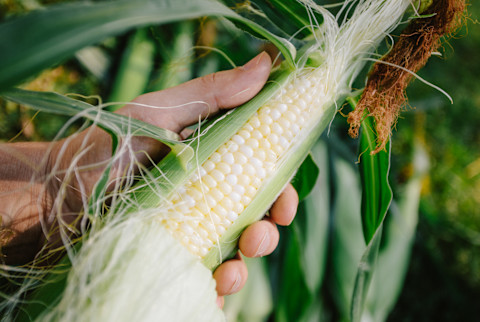Is Corn A Grain, A Fruit, Or A Vegetable—And Is It Actually Healthy?

Some foods are harder to classify into specific food groups—looking at you, avocados and tomatoes. Another one to add to that list: corn. Many people think of corn as a vegetable, but it's sometimes shunned from certain diets due to its carb and sugar content. So what exactly is corn, and is it healthy?
Is corn a grain?
Most nutritionists you ask will tell you corn qualifies as a whole grain.
"Whole grains have three edible layers—the bran, germ, and endosperm," registered dietitian nutritionist Shamera Robinson, MPH, RDN, L.D., tells mbg. "Each layer offers a different ratio of macronutrients, vitamins, minerals, and antioxidants to help nourish your body. Brown rice, oats, and wheat are popular whole grains, but corn kernels also contain those three nutrient-rich layers," she says.
Corn is also part of the grass family of plants, similar to wheat, barley, and rice, registered dietitian and spokesperson for the Academy of Nutrition & Dietetics Julie Stefanski, MEd, RDN, tells mbg.
"Everything that is made from corn—tortillas, cornflakes, and grits, for example—are in the grain category," Stefanski says. This also makes popcorn a perfect snack for meeting your grain goals, Robinson adds.
Is corn a vegetable?
In terms of nutrition, corn is more similar to whole grain bread than to a vegetable, Stefanski says. "Just like one slice of bread, half a cup of corn contains a similar amount of calories and carbohydrates," she explains.
Corn is also higher in starch than green leafy vegetables, like spinach, kale, and broccoli. That said, it can still be part of a well-balanced diet. "Try including corn as a side dish along with a less starchy vegetable, such as grilled zucchini," Stefanski suggests.
Is corn a fruit?
According to Robinson, it depends on whom you ask. "Botanically, or based on plant science, a fruit contains seeds and comes from the flower of a plant," she explains. "Corn kernels certainly fit that description."
That said, most people ignore the science and categorize their food based on taste. "Its mild flavor and popularity as a savory side dish lands corn as a vegetable on many menus and food lists," Robinson says. It also doesn't stack up nutritionally to most fruits, Stefanski says.
So, what is corn, and is it healthy?
"Corn is a culinary and cultural staple for people around the world," Robinson says. "While there may be debate on whether corn is a fruit, grain, or vegetable, there is no question about the nutrients it can provide."
These are the nutrients in one small ear of corn1, according to the U.S. Department of Agriculture (USDA) food database:
Corn nutrition
- Calories: 62.8
- Carbohydrates: 13.7 g
- Sugar: 4.57 g
- Fiber: 1.46 g
- Protein: 2.39 g
- Magnesium: 27 mg
- Phosphorus: 65 mg
- Potassium: 197 mg
- Vitamin C: 4.96 mg
- Folate: 30.7 µg
Corn is high in insoluble fiber, which is good for the gut and digestive health. "Insoluble fiber is beneficial for preventing constipation and helping us feel full after a meal," Stefanski says. If eating corn leads to an upset stomach, she recommends chewing each kernel thoroughly and limiting intake to just one ear of corn.
Along with fiber, Robinson says corn is an affordable source of protein and other nutrients, which are key to building balanced meals.
The takeaway
Corn is commonly categorized as a vegetable because of its taste, but based on how it's grown, it could also be classified as a fruit or a grain. Corn may be high in carbohydrates and starch, but it's also high in fiber and other nutrients, making it a healthy side to other veggies.
